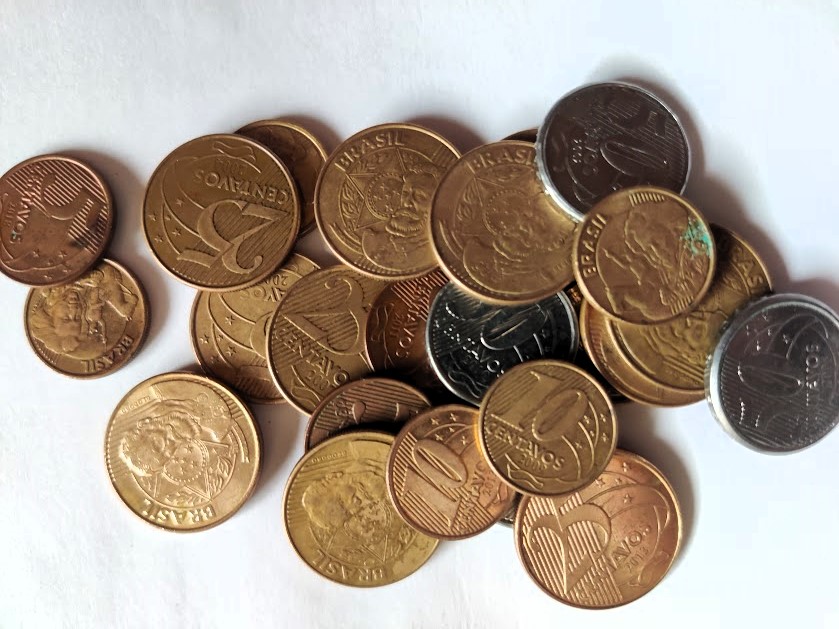This post gives an overview of money in Brazil as well as related Brazilian Portuguese vocabulary.
The currency of Brazil is the real (which sounds like “hey-al”), symbolised as R$. The plural of real is reais (which sounds like “hey-ice”).
Introduced in July 1994 as part of the Plano Real to stabilise the economy after years of hyperinflation, £1 is worth around seven reais (June 2024).

Banknotes and coins
The Brazilian currency system includes both banknotes (as notas de banco) and coins (as modeas). The banknotes have pictures of Brazilian flora and fauna and are differently sized with bigger notes used for larger values.
Each real is subdivided into 100 centavos. Whilst denominations are similar to other currencies, one thing you’ll notice is that Brazilians use a comma to separate values where you might expect to see a full-stop (e.g. R$ 5,99).
| Coins | Bank notes |
| 1 centavo | R$ 2,00 |
| 5 centavos | R$ 5,00 |
| 10 centavos | R$ 10,00 |
| 25 centavos | R$ 20,00 |
| 50 centavos | R$ 50,00 |
| R$ 1,00 | R$ 100,00 |
Travelling to Brazil
As with using your credit or debit card anywhere abroad, you will probably need to inform your bank about your travel plans to avoid getting blocked by anti-fraud systems. Cards are widely accepted in Brazil, however, it would be wise to carry some cash, particularly to make purchases at food markets and street fairs. Currency can be exchanged for Brazilian Reais before travelling, but ATM machines are widely available.
Paying in instalments
After being asked by the cashier (o caixa) if you want to pay by credit (crédito) or debit (débito) card, you may also be asked if you want to pay in instalments. This is very popular in Brazil and is used to pay for a whole range of items, including higher ticket items and everyday purchases.
Brazilian Portuguese vocabulary related to money and spending
| money | o dinheiro |
| change | o troco |
| banknote | a nota de banco |
| coin | a moeda |
| debit card | o cartão de débito |
| credit card | o cartão de crédito |
| bank | o banco |
| cash machine | o caixa eletrônico |
| bureau de change | a agência de câmbio |
| exchange rate | a taxa de câmbio |
| cashier | o caixa |
| to spend | gastar |
| to pay in instalments | parcelar |
The verb pagar (to pay)
In Brazilian Portuguese, the verb pagar is commonly used without the preposition “for” as in English. For example, pago a conta means “I pay the bill.” Understanding this is helpful in everyday transactions.
